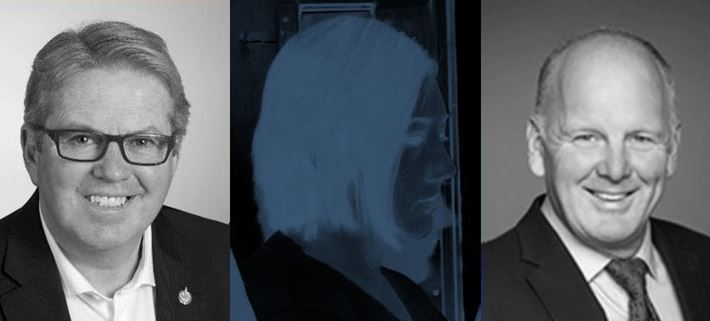Party politics is an ugly business, but so is the murder of a child.
In 2010, Terri-Lynne McClintic pleaded guilty to being one of two people accused of murdering 8-year-old Tori Stafford. The girl was raped, and her life was taken with a claw hammer.
Such an atrocity is difficult to read about, let alone understand the devastation of the girl's family. And yet it's important to know the circumstances of the crime. This knowledge is necessary in order to understand why there is such outrage among Canadians when they learn that the child-murderer, McClintic, was transferred to a "healing lodge" in 2017 - an unfenced, minimum security "prison".
For those of you who are vehemently partisan supporters of the Liberal party, to the point where you accept no opportunity for criticism of them, you are reading this with contempt. Surely the photo I've showcased with our local MPs Rodger Cuzner and Mark Eyking, and my willingness to discuss this topic at all, are offensive to you.
That's the problem with party politics. We surrender whatever objectivity we have when we start behaving like hockey fans instead of citizens and act as though our preferred Liberals, Conservatives, or NDPers wear jerseys and go to work with skates on.
Although I understand the use of partisan politics from a strategic perspective, my thought process remains independent of party politics. Of course, none of us are ever free from bias. But it is possible to focus on trying to be more objective and to consider how we feel about something without having to check to see if they are a member of "our party" first.
I can see the potential for a declining Trudeau losing the Federal election, while simultaneously seeing no favourable Federal Party or leader to take his place. All parties play a role in the ugliness of party politics.
When the Federal Conservatives put forward a motion to have the government compel McClintic to go back to a prison that would put her behind steel bars, they knew the motion would not pass.
I'm certain the PC representatives also universally knew that it was a powerful opportunity to hammer Prime Minister Trudeau and his Liberal MPs with another issue that provokes outrage for Canadians.
While Trudeau showed the confidence (or arrogance) of his father in calling the Torys "ambulance-chasers", and despite his characterization of the Conservatives not being entirely far-fetched, he'll lose this issue in the hearts and minds of regular, everyday Canadians from coast to coast.
Here in Cape Breton, we pay some attention to what is going on in the rest of the country too.
Both of our MPs, Cuzner and Eyking, stood up and voted against the motion.
In so doing, they joined their Liberal colleagues in opposing an intervention in the Canadian Correctional System that would see a child-murderer transferred back to the sort of prison people identity with punishment as opposed to healing, and associated with bars instead of lodges.
It's ok for us to ask our MPs about their choices.
They are Federal Members of Parliament, and we've entrusted them (by way of a majority vote for a Liberal government) to contemplate and represent on us issues that affect the entire country.
We owe them no polite gesture of not presenting them with difficult questions and expecting them to describe how they arrived at their decisions.
It's important to acknowledge that there is a much larger discussion far beyond the scope of this brief article. It includes Canada's correctional system, and alternative methods of punishment for crime, deterrence from crime, methods of lowering of recidivism (or repeat crime), and the overall approach to the rehabilitation of criminals to prepare them to re-enter society as law-abiding citizens.
When a child is murdered, emotion buries these layers of important discussion topics about justice in society.
It's clear that the Conservatives have both genuine outrage among their ranks, and also the intent for political opportunism.
Trudeau is likely correct in his assertion about the decision, his recognition of the finger-trap his MPs were placed in, and his awareness of this issue as a tactic to further attack himself and the Liberal party.
And yet the Prime Minister's response seemed more intent on embracing the fights that arise in ugly party politics instead of being more sensitive about the issue, and more empathetic to how everyday Canadians feel when they are compelled to think about the murder of a child.
If Rodger Cuzner and Mark Eyking were able to sit down with us for a beer and be free to talk about how they feel personally, I'm not convinced they don't share a sense of outrage too.
But partisan politics saw them rise and vote in what seems like an endorsement of the murderer remaining in a healing lodge instead of what we think of as a traditional prison environment.
They are our Federal representatives, and it's ok for us to ask them why they voted the way they did.
It's ok for us to ask them for clarity. And we should.
NOTE: The views expressed above are my own and do not represent lokol (goCapeBreton.com). Read more






1
Log In or Sign Up to add a comment.- 1
arrow-eseek-e1 - 1 of 1 itemsFacebook Comments